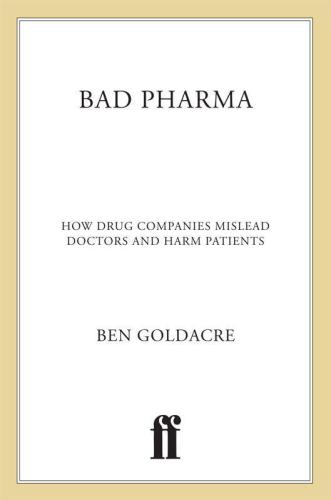
Bad Pharma
How Drug Companies Mislead Doctors and Harm Patients
چگونه شرکتهای مواد مخدر پزشکان را گمراه میکنند و بیماران را آزار میدهند
کتاب های مرتبط
- اطلاعات
- نقد و بررسی
- دیدگاه کاربران
نقد و بررسی

January 14, 2013
In this searing exposeÌ of the pharmaceutical industry, physician and journalist Goldacre (Bad Science) uncovers a cesspool of corrupt practices designed to sell useless ordangerous drugs to an unsuspecting public. His main focus is the distortion of the science on which evidence-based medicine relies: drug companies, he argues, deploy deliberately biased clinical trials and twisted statistics to exaggerate their drugsâ benefits, while suppressing countless studies that show negative results or deadly side effects. Big Pharmaâs malign influence doesnât stop there, he contends; doctorsâ prescribing practices are determined not by patientsâ needs but by the insidious bribes and blandishments of sales representatives, the industryâs ubiquitous "educational" programs, and fake research articles, journals, and even textbooks signed by independent academics but authored by industry-hired ghost writers. Goldacreâs indictment fingers many culpritsâprofit-hungry industry executives, lax regulatory agencies that collude in hiding crucial information from the public, and complaisant journal editors and university officials who put their imprimatur on blatant misconduct. Drawing on a wealth of research but writing squarely for laypeople, Goldacre conveys complicated scientific, medical, and ethical issues in simple, clear, plainspoken language that pulls no punches. The result is a smart, infuriating diagnosis of the rotten heart of the medical-industrial complex. Agent: ZoeÌ Pagnamenta, the ZoeÌ Pagnamenta Agency.

December 1, 2012
An explanation of why pharmaceutical companies have come under increasing scrutiny in recent years. As both a physician and medical correspondent (Bad Science, 2010), Goldacre has been in the catbird seat in regard to the detection of medical fraud. Here, he discusses the gray area in which drug companies can legally manipulate data in order to package experimental results in the most attractive way. Although Goldacre practices medicine in the U.K., his book is applicable to the U.S. pharmaceutical industry. He explains what should be an obvious flaw in the system: The majority of experiments validating the safety and benefits of new drugs are funded by the pharmaceutical industry, either directly or indirectly, through grants to universities and other methods. Because of this, writes Goldacre, "industry-sponsored studies are more likely to produce results that flatter the sponsor's drug." The author cites the conclusion by three researchers from Harvard and Toronto, who conducted a meta-analysis of data on antidepressants and other drugs in 2010. They found major discrepancies in results related to reported effectiveness between research conducted by industry-funded and government-funded trials. Goldacre believes that such reviews should be conducted routinely, backdated and made easily available to the public. Currently, pharmaceutical companies are not obligated to publish results that are unfavorable to their product. Another shady tactic is touting the short-term performance of drugs that become less effective over time. The author supports enforceable government regulation. A useful guide for policymakers, doctors and the patients who need protection against deliberate disinformation.
COPYRIGHT(2012) Kirkus Reviews, ALL RIGHTS RESERVED.

December 1, 2012
In the follow-up to his popular Bad Science (2010), British medical doctor Goldacre reveals how pharmaceutical companies mislead doctors and hurt patients. They sponsor trials, which tend to yield favorable results, while negative results often remain unreported. He also reports that drug companies spend twice as much on marketing and advertising as on researching and developing new drugs. Unfortunately for U.S. readers, he focuses largely on the UK, but ghost authorship of studies and continuing medical education boondoggle trips for doctors are problematic everywhere, and he does refer to the U.S. Food and Drug Administration on multiple occasions. And everyone, everywhere should feel unsettled by his discovery that pharmaceutical companies funnel $10 million to $20 million a year to such major medical journals as the New England Journal of Medicine and the Journal of the American Medical Association. Not surprisingly, he notes, studies funded by the pharmaceutical industry are that much more likely to get published in these influential journals. Goldacre's essential expos' will prompt readers to ask more questions before automatically popping a doctor-prescribed pill.(Reprinted with permission of Booklist, copyright 2012, American Library Association.)

























دیدگاه کاربران